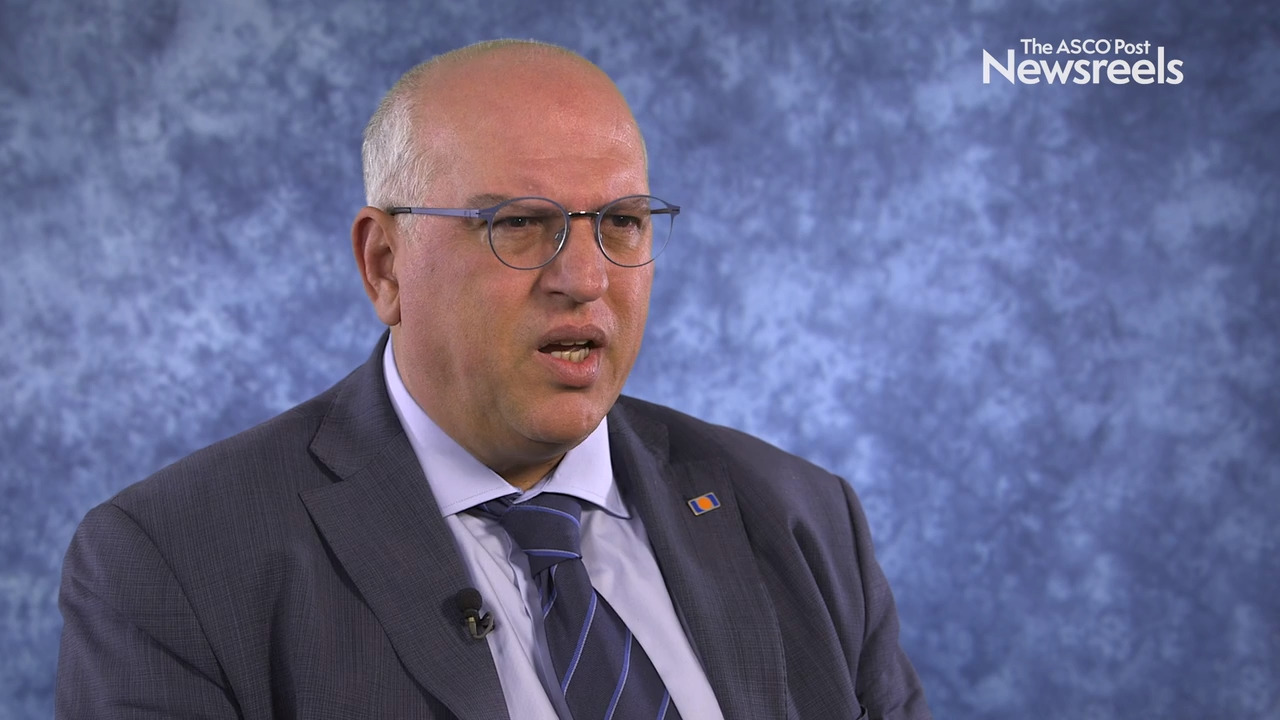ESMO 2019: 3-Year Results From CheckMate 238: Adjuvant Nivolumab vs Ipilimumab in Advanced Melanoma
Superior recurrence-free survival benefit was observed with nivolumab vs ipilimumab—and was consistent across disease stage, programmed cell death ligand 1 (PD-L1) expression levels, and BRAF mutation status—in patients with resected stage III/IV melanoma and a high risk of recurrence, according to ...
Ana Maria Arance Fernandez, MD, PhD, on Advanced Melanoma: Treatment With Cobimetinib/Atezolizumab vs Pembrolizumab
Ana Maria Arance Fernandez, MD, PhD, of the Hospital Clínic de Barcelona, discusses the negative results of the phase III IMspire170 trial, which evaluated cobimetinib/atezolizumab vs pembrolizumab monotherapy in patients with BRAF V600 wild-type melanoma (Abstract LBA69).
Georgina V. Long, MD, PhD, on Melanoma Brain Metastases: Nivolumab Alone or Nivolumab/Ipilimumab
Georgina V. Long, MD, PhD, of the Melanoma Institute Australia, The University of Sydney, discusses long-term outcomes from a phase II trial which showed that nivolumab/ipilimumab therapy demonstrated durable intracranial responses in patients with melanoma brain metastases. No new adverse events were reported (Abstract 1311O).
Sungjune Kim, MD, PhD, on Merkel Cell Carcinoma: Nivolumab/Ipilimumab Plus SBRT
Sungjune Kim, MD, PhD, of the H. Lee Moffitt Cancer Center and Research Institute, discusses phase II study findings on the safety and tolerability of nivolumab/ipilimumab plus stereotactic body radiation therapy (Abstract 1321P).
Paolo A. Ascierto, MD, on Melanoma: Results From CheckMate 238 on Adjuvant Nivolumab vs Ipilimumab
Paolo A. Ascierto, MD, of the Istituto Nazionale Tumori, Napoli, discusses phase III study findings confirming the superior activity of nivolumab vs ipilimumab in resected stage III/IV melanoma in terms of regression-free survival after a minimum follow-up of 36 months (Abstract 1310O).
ESMO 2019: 5-Year Survival and Response With Nivolumab/Ipilimumab in Advanced Melanoma
An update of results of the phase III CheckMate 067 trial at 5 years presented by Larkin et al at the European Society for Medical Oncology (ESMO) 2019 Congress showed that both nivolumab in combination with ipilimumab and nivolumab alone provided significant improvements in overall survival,...
Treatment-Free Survival as an Outcome Measure of Nivolumab/Ipilimumab Therapy in Advanced Melanoma
In a pooled analysis reported in the Journal of Clinical Oncology, Regan et al evaluated treatment-free survival as an outcome measure among patients with advanced melanoma receiving nivolumab/ipilimumab or either agent alone in the CheckMate 067 and 069 trials. Study Details The study involved...
Stage IV Melanoma: What Current Role Should Surgery Play?
Advanced melanoma has become a different entity in the era of immunotherapy and targeted agents. Considering the potential for good outcomes from systemic therapy in advanced disease, has the role of surgery changed? Should it be offered up front or limited to patients with oligometastatic ...
Phase Ib Trial of Toripalimab/Axitinib in Asian Patients With Advanced Mucosal Melanoma
In a Chinese phase Ib study reported in the Journal of Clinical Oncology, Sheng et al reported activity with the combination of the anti–programmed cell death protein 1 (PD-1) agent toripalimab plus axitinib in patients with metastatic mucosal melanoma. As stated by the investigators, whereas...
Genomic Landscape of Merkel Cell Carcinoma
Researchers have developed the largest descriptive genomic analysis of patients with Merkel cell carcinoma to date. Their analysis, published by Knepper et al in Clinical Cancer Research, will provide important information to improve the care and treatment of patients with Merkel cell...
Long-Term Follow-up of Patients With Melanoma, Kidney Cancer, and Lung Cancer Receiving Nivolumab
As reported by Suzanne L. Topalian, MD, and colleagues in JAMA Oncology, long-term follow up of patients from a phase I expansion cohort study indicated 5-year overall survival rates of 34.2%, 27.7%, and 15.6% among patients who received nivolumab monotherapy for advanced melanoma, renal cell...
5-Year Follow-Up of KEYNOTE-006 Trial of Immunotherapy Regimens in Advanced Melanoma
In a post hoc 5-year follow-up of the KEYNOTE-006 trial reported in The Lancet Oncology, Caroline Robert, MD, PhD, and colleagues found that pembrolizumab maintained overall and progression-free survival benefits over ipilimumab in patients with advanced melanoma. In the primary analysis from the...
Impact of Genes on Total Number and Type of Nevi
A study by Duffy et al in the Journal of Investigative Dermatology reported on specific gene variations affecting the number and types of moles on the body and their role in causing skin cancer. “The goal was to investigate the genetic underpinnings of different mole classes, or...
Risk of Cardiovascular Adverse Events in Patients With Melanoma Treated With Combined BRAF and MEK Inhibition vs BRAF Inhibition Alone
In a meta-analysis reported in JAMA Network Open, Mincu et al found that the risk of some types of cardiovascular adverse events was higher with combined BRAF and MEK inhibitor treatment vs BRAF inhibitor monotherapy in patients with melanoma. The meta-analysis included 2,317 patients in five...
Addition of IDO1 Inhibitor to Immunotherapy in Melanoma
As reported in The Lancet Oncology by Georgina V. Long, PhD, and colleagues, the phase III ECHO-301/KEYNOTE-252 trial showed no improvement in progression-free or overall survival with the addition of the IDO1 inhibitor epacadostat to pembrolizumab in unresectable stage III or stage IV melanoma....
Pembrolizumab for Advanced Merkel Cell Carcinoma
Late in 2018, pembrolizumab was granted accelerated approval in the treatment of adult and pediatric patients with recurrent locally advanced or metastatic Merkel cell carcinoma.1,2 Supporting Efficacy Data Approval was based on Cancer Immunotherapy Trials Network protocol 9 (CITN-09), also known...
Can Genetic Counseling and Test Reporting in Patients Susceptible to Melanoma Development Change Behavior?
A new study published by Stump et al in Genetics in Medicine investigated whether genetic testing would motivate people at risk of developing melanoma to alter their behavior in order to reduce their risk. “We are trying to understand whether a genetic test result adds value over and above...
Is Vitamin A Intake Linked to Cutaneous Squamous Cell Carcinoma Risk?
People whose diets included high levels of vitamin A had a 17% reduction in risk for developing cutaneous squamous cell carcinoma, as compared to those who ate modest amounts of foods and supplements rich in vitamin A. These findings were published by Kim et al in JAMA Dermatology. Vitamin A is...
FDA Pipeline: Breakthrough Therapy for Melanoma, Investigational New Drug for Advanced Solid Tumors
This week, the U.S. Food and Drug Administration (FDA) granted Breakthrough Therapy designation to bempegaldesleukin in combination with nivolumab for advanced melanoma and cleared an investigational new drug application for a phase I trial of SB 11285 in advanced solid tumors. Breakthrough...
Post Hoc 5-Year Follow-up of Pembrolizumab vs Ipilimumab in Advanced Melanoma
In a post hoc 5-year follow-up of the KEYNOTE-006 trial reported in The Lancet Oncology, Robert et al found that pembrolizumab maintained overall and progression-free survival benefits over ipilimumab in patients with advanced melanoma. In the primary analysis from the trial, both pembrolizumab...
Survey Finds Majority of Americans Are Unfamiliar With Cutaneous Squamous Cell Carcinoma
Nearly-three quarters of Americans are not familiar with cutaneous squamous cell carcinoma, the second most common type of cancer in the United States, according to a new survey conducted by The Harris Poll on behalf of The Skin Cancer Foundation. Cutaneous squamous cell carcinoma is more common...
Five-Year Survival in Heavily Pretreated Patients Receiving Nivolumab Monotherapy
As reported by Topalian et al in JAMA Oncology, long-term follow up of patients from a phase I expansion cohort study indicated 5-year overall survival rates of 34.2%, 27.7%, and 15.6% among patients who received nivolumab monotherapy for advanced melanoma, renal cell carcinoma (RCC), and...
Expert Point of View: Vernon K. Sondak, MD
Commenting for The ASCO Post, melanoma expert Vernon K. Sondak, MD, Chair of the Department of Cutaneous Oncology at Moffitt Cancer Center, Tampa, maintained that the association between immunotherapy-related toxicity and better outcomes is not yet clear. He first noted the impact of novel...
Study Finds Immune-Related Adverse Events Herald Benefit With Adjuvant Pembrolizumab in Melanoma
In the EORTC 1325/KEYNOTE-054 trial of adjuvant pembrolizumab in patients with stage III melanoma, recurrences were reduced by 44% in the immunotherapy arm, vs placebo, but this benefit increased to a 63% reduction in risk among patients developing an immune-related adverse event on treatment.1...
Family History of Melanoma May Increase Risk for Nonmelanoma Skin Cancers
A study by Wei et al in the Journal of the American Academy of Dermatology has found that individuals with a first-degree relative with a history of melanoma are at an increased risk for melanomas and keratinocyte cancers such as squamous cell carcinoma and basal cell carcinoma. Methods...
Upgrading of Nonmelanoma Skin Cancers at the Time of Mohs Surgery
Nonmelanoma skin cancers may display an aggressive histologic subtype that is not diagnosed on initial biopsy. In a prospective, cross-sectional study reported by Kyllo et al in the Journal of the American Academy of Dermatology, researchers determined that a significant portion of nomelanoma...
Does Size of Surgical Excision Margins for Thick Localized Cutaneous Melanoma Affect Survival Outcomes?
In a nearly 20-year follow-up of a Scandinavian trial reported in The Lancet, Utjés et al found no difference in survival outcomes with 2-cm vs 4-cm surgical excision margins for primary localized cutaneous melanoma with a thickness > 2 mm. The previous report from the trial showed no...
FDA Pipeline: Designations and Applications Granted in Lymphoma, Small Cell Lung Cancer, Multiple Myeloma, and More
Recently, the U.S. Food and Drug Administration (FDA) granted Fast Track designation to a phospholipid-drug conjugate in diffuse large B-cell lymphoma; granted Orphan Drug designation to an immunotherapy for small cell lung cancer (SCLC); accepted supplemental biologics license applications (sBLAs) ...
Anti-KIR3DL2 Monoclonal Antibody for Relapsed or Refractory Cutaneous T-Cell Lymphoma
In a phase I trial reported in The Lancet Oncology, Bagot et al found that IPH4102—a first-in-class monoclonal antibody targeting KIR3DL2—was safe and showed activity in patients with relapsed or refractory cutaneous T-cell lymphoma, particularly those with Sézary syndrome....
ECHO-301/KEYNOTE-252: Addition of Epacadostat to Pembrolizumab in Unresectable or Metastatic Melanoma
As reported in The Lancet Oncology by Long et al, the phase III ECHO-301/KEYNOTE-252 trial showed no improvement in progression-free or overall survival with the addition of the IDO1 inhibitor epacadostat to pembrolizumab in unresectable stage III or stage IV melanoma. Study Details In the...
15-ICML: Final Data From ALCANZA: Brentuximab Vedotin for CD30-Positive CTCL
Final analyses from the ALCANZA study, a phase III trial investigating brentuximab vedotin vs physician’s choice for the treatment of CD30-positive cutaneous T-cell lymphoma (CTCL), were presented by Horwitz et al at the 15th International Conference on Malignant Lymphoma (ICML; Abstract...
Comparison of Combination Dosing Schedules of Neoadjuvant Ipilimumab/Nivolumab in Macroscopic Stage III Melanoma
In the phase II OpACIN-neo study reported in The Lancet Oncology, Rozeman et al identified a promising dosing schedule for neoadjuvant ipilimumab/nivolumab in macroscopic stage III melanoma. Study Design The trial included 86 evaluable patients with resectable stage III melanoma involving the...
Performance of Machine-Learning Classifiers in the Diagnosis of Pigmented Skin Lesions
In a study conducted under the supervision of researchers from the MedUni Vienna, human experts competed against computer algorithms in diagnosing pigmented skin lesions. The algorithms achieved better results when diagnosing, but had decreased performance for out-of-distribution images. These...
Neoadjuvant Dabrafenib/Trametinib in Stage IIIB/C, BRAF V600–Mutant Melanoma
In the single-center, phase II NeoCombi trial reported in The Lancet Oncology, Long et al found that neoadjuvant dabrafenib plus trametinib produced promising response rates in resectable, stage IIIB/C, BRAF V600–mutant melanoma. As noted by the investigators, adjuvant dabrafenib plus...
2019 ASCO: OPTiM Study on T-VEC for Unresectable Melanoma
New research on the immunotherapy talimogene laherparepvec (T-VEC)—an injectable oncolytic virus—for patients with unresectable melanoma was presented by Milhem et al at the 2019 ASCO Annual Meeting (Abstract 9524). Researchers reported the ad hoc analysis of progression-free survival...
2019 ASCO: Long-Term Survival With Dabrafenib Plus Trametinib in Metastatic BRAF-Mutated Melanoma
In an extended analysis of the COMBI-d and COMBI-v trials reported at the 2019 ASCO Annual Meeting (Abstract 9507) and in The New England Journal of Medicine, Robert et al found a 5-year overall survival rate of 34% with the combination of dabrafenib and trametinib in previously untreated...
UMass Lowell Student Wins Award for Research in Skin Cancers
Tyler Iorizzo, a PhD candidate in physics at UMass Lowell’s Advanced Biophotonics Laboratory, has won international recognition for his work in developing an imaging device that could lead to improved diagnosis and treatment of certain skin cancers. Mr. Iorizzo received an Educational Award from...
Ahmad A. Tarhini, MD, PhD, on High-Risk Melanoma: Adjuvant Ipilimumab vs High-Dose Interferon-α2b
Ahmad A. Tarhini, MD, PhD, of Emory University and Winship Cancer Institute, discusses phase III findings from the U.S. Intergroup E1609 trial, which showed survival benefits for patients with resected high-risk melanoma—for the first time in the history of melanoma adjuvant therapy (Abstract 9504).
NCCN Clinical Practice Guidelines in Oncology: 2019 Updates
In 1996, the National Comprehensive Cancer Network® (NCCN®) published its first set of Clinical Practice Guidelines in Oncology (NCCN Guidelines®), covering eight tumor types. NCCN Guidelines are now published for more than 70 tumor types and topics. Some of the key updates for 2019 were presented...
Predicting Response to Immunotherapy in Squamous Cell Carcinoma
According to a study published by Kacew et al in the European Journal of Cancer, copy number alterations in the chromosome 3q arm may be linked to immunotherapy response in patients with cutaneous squamous cell carcinoma. In fact, this and other genetic markers may prove to be useful...
Lifetime Risk of Brain Metastases in Elderly Survivors of Breast, Lung, and Skin Cancers
Elderly survivors of breast cancer, lung cancer, and melanoma face risk of brain metastasis later in life, and may require extra surveillance in the years following initial cancer treatment, according to results of a study published by Ascha et al in Cancer Epidemiology, Biomarkers, &...
Neoadjuvant Immunotherapy Associated With Improved Outcomes in Patients With Locally Advanced Melanoma
ACCORDING TO DATA from a small prospective study presented at the 2019 Society of Surgical Oncology Annual Cancer Symposium,1 neoadjuvant immunotherapy significantly prolonged relapse-free survival vs adjuvant immunotherapy in patients with stage III or oligometastatic stage IV melanoma intended...
Link Between Skin Cancer Diagnosis and Health-Care Screening Practices
According to findings published by Drucker et al in JAMA Dermatology, patients undergoing health-care screening practices for skin cancer have a higher likelihood of being diagnosed—particularly for squamous cell and basal cell carcinomas—than those who do not. Researchers...
PD-1 Inhibitor–Associated Cutaneous Toxicity and Clinical Outcomes in Advanced Melanoma
In a research letter published in JAMA Oncology, Quach et al found that cutaneous toxicities related to anti–programmed cell death protein 1 (PD-1) treatment—specifically, vitiligo and rash—were associated with improved clinical outcomes in advanced melanoma. Study Details The...
Molecular Profiles and Immunotherapy Outcomes in BRAF V600E– and V600K–Mutant Melanoma
In a study reported in Clinical Cancer Research, Alexander M. Menzies, MD, of Melanoma Institute Australia, The University of Sydney, and Royal North Shore and Mater Hospitals, and colleagues found that BRAF V600K melanomas are less responsive to BRAF inhibitor with or without MEK inhibitor...
Does Squamous Cell Carcinoma Risk Change With Immunosuppression?
Immunosuppressed patients seem to have an increased risk of poor outcomes with multiple squamous cell carcinomas compared with those who are immunocompetent. Jessica L. Gonzalez, MD, of Tufts Medical Center in Boston, and colleagues published the results of a single-center case-control study...
Does Intake of Dietary Fat Increase Risk of Skin Cancer?
Dietary intake of fat is associated with several types of cancer, but few studies have explored the link between fat intake and the risk of skin cancer. In a study published by Park et al in Cancer Epidemiology, Biomarkers & Prevention, researchers examined the relationship between fat intake...
FDA Pipeline: Designation in Uveal Melanoma, Application for MDS Side-Effect Management
Over the past week, the U.S. Food and Drug Administration (FDA) granted a Fast Track designation to a treatment for metastatic uveal melanoma and received a biologics application for an agent to control anemia. Fast Track Designation for Tebentafusp in Metastatic Uveal Melanoma The FDA granted...
Skin Cancer 2019: Recurrence and Staging of Cutaneous Squamous Cell Carcinoma After Mohs Surgery
Mohs surgery is known to have lower recurrence rate compared to conventional wide excision for removal of cutaneous squamous cell carcinomas. However, cutaneous squamous cell carcinoma does sometimes recur—even after Mohs surgery. In a Korean study by Roh et al presented at the World Congress ...
Skin Cancer 2019: Small Study of Electrochemotherapy for Basal Cell Carcinomas in the Head and Neck Region
Increasing evidence is emerging about the effectiveness of electrochemotherapy in the treatment of basal cell carcinomas in the head and neck region. A study presented by Kis et al at the World Congress on Advanced Treatments and Technologies in Skin Cancer (Skin Cancer 2019) (Poster Board 6) aimed ...





